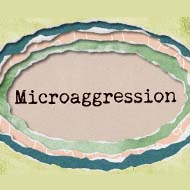BVA releases resources on microaggressions

67 per cent of incidents of discrimination in the veterinary workplace were carried out by colleagues.
The BVA has launched resources to spark conversation and educate veterinary professionals on microaggressions in the workplace.
A series of posters, entitled 'Lets talk about microaggressions', have been released by the BVA, in the hopes that practices and veterinary education centres will display them to raise awareness of common microaggressions against marginalised groups.
Microaggressions are comments and actions which target a marginalised group of people in a negative manner. Whether they are intended or accidental, these microaggressions are a form of discrimination, based on stereotypes.
New research from the BVA shows that one in six vets surveyed (15 per cent) have personally experienced discrimination in their veterinary workplace or educational facility this year, while the Spring 2021 Voice of the Veterinary Profession survey displayed that just over one in five veterinary professionals have witnessed discrimination, and that the majority of incidents were carried out by colleagues.
Developed with the British Veterinary Ethnicity and Diversity Society, British Veterinary LGBT+, British Veterinary Chronic Illness Support, Vetlife, and other advisors, it is hoped that these posters will encourage those in the veterinary sector to consider the impact of their words, and the open up a 'big conversation' on microaggressions as a form of discrimination.
BVA junior vice president Malcolm Morley commented on the initiative: “I am extremely concerned that so many vets are still being subjected to discrimination in the places where they work and study, and it’s more disturbing that many of these incidents are being carried out by colleagues.
“While some of these incidents will certainly have been intentional, it’s also likely that there are many subtle ‘microaggressions’ taking place, where the speaker did not intend the harm they caused.
“Unfortunately, having good intentions doesn’t always stop us from hurting others, particularly if our comments are just one of a number of similar interactions a person has had to endure.
“We can all help by developing our understanding of why our words can be harmful. So, we’re asking you to join our #BigConversation about microaggressions, to help us all consider and evolve our own language.
“Some of these conversations may be difficult but they’re an opportunity for all of us to help ensure veterinary learning and working environments are welcoming and inclusive for everyone.”
The posters, along with blogs on the impact of microaggressions, are available to read here. The BVA is asking practices to consider displaying the posters to help raise awareness of the discrimination.



 The Animal and Plant Health Agency (APHA) has updated its online reporting service for dead wild birds.
The Animal and Plant Health Agency (APHA) has updated its online reporting service for dead wild birds.